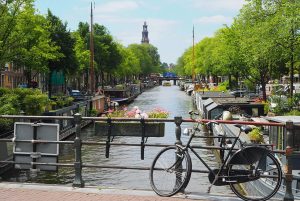Business
5 Amazing Countries to Work Abroad in 2023

5 Amazing Countries to Work Abroad in 2023
Living and working abroad is a fantastic way to learn about the world, yourself, and what it means to be a global citizen. As the world becomes more and more interconnected, a growing number of people are seeking work outside of their home country, but deciding where to go abroad can be difficult.
To help you find your dream job abroad, we’ve compiled a list of the best countries to work abroad. In creating this list, we considered various factors, including work-life balance and happiness indices, the cost of living, the ease of getting a work visa, and the job opportunities in the country. With that, our goal is to provide a variety of options not limited to the most traditional expat destinations.
So, where will you go? Let’s check out the 10 best countries to work abroad to decide!
1. Great for seasonal work: New Zealand
Cost of living: $927 (1,563 NZD) a month + rent
💰 Average Salary: $3,323 (5,603 NZD) a month
⏰ Work visa duration: 12 – 23 months based on residency
😊 Happiness index ranking: 10
If you’re a young adult looking to expand your perspective through a grand adventure and plan to fund it with intermediate work along the way, New Zealand may be the perfect destination for you! From adventure sports companies to tour operators to farmers, there are seemingly endless short-term and seasonal employment opportunities throughout the country.
New Zealand regularly ranks among the happiest countries globally, including a 10th place ranking on The Global Economy 2022 Happiness index. The laid-back culture and emphasis on a healthy work-life balance create a truly unique atmosphere. Kiwis are also extremely friendly, and most travelers find it quite easy to adapt to life in New Zealand as a result.
As a remote island nation, the cost of living in New Zealand is high so it’s important to budget appropriately if you want to build savings while working there. You’ll find that most job opportunities outside of agriculture will be in or around Auckland, Wellington, or smaller, tourist towns like Queenstown. Work exchange programs are popular to mitigate this for those looking for short-term work opportunities to supplement travel.
✅ Pros:
- Relaxed work-life balance
- Progressive and welcoming government and citizens
❌ Cons:
- Limited career mobility within certain fields due to small population
- Life can feel fairly quiet and isolated
How to get a work visa in New Zealand
New Zealand offers a working holiday scheme to residents from specific countries throughout the world. The working holiday visa permits work and travel throughout New Zealand for up to 12 months, or 23 months if you are a citizen of the UK or Canada.
To learn more about acquiring a visa to work in New Zealand, visit the New Zealand Immigration web portal.
How to find work in New Zealand
Start your job search well before the season you plan to be employed during. If you want to work during the ski season, check out NZSki. Agriculture work is often listed on Seasonal Jobs New Zealand. Additionally, check out the Go Overseas Job Board and filter by job type to find recent job postings.
2. Great for jobs in research and academia: The Netherlands
Cost of living: $975 (€972) a month + rent
💰 Average Salary: $3,025 (€3,017) a month
⏰ Work visa duration: Indefinent with a company sponsor
😊 Happiness index ranking: 5
A favorite destination among expats due to its quality of life and work-life balance, the Netherlands is another excellent option for working abroad. The Netherlands actively seeks out international entrepreneurs and has many great programs to help them invest in local companies or start their own businesses, big and small.
The Netherlands is a safe country with great social programs and a strong economy. Additionally, the Netherlands is on the cutting edge of research and academia, and expats will find abundant opportunities to work in these fields. With a strong focus on sustainable energy and a clean environment, the Netherlands is also a great place to find work in tech or energy.
Working in the Netherlands requires a company sponsor for non-European citizens, and the cost of living is relatively high, so this is a destination for career-minded international workers and is not as suitable for short-term or temporary work. If you dream of finding a career in the Netherlands but aren’t sure where to start, consider getting an internship there first.
✅ Pros:
- The vast majority of Dutch people speak English
- Low crime rates
❌ Cons:
- It can be hard to make friends with local people due to close-knit social circles
- Salaries are high but expenses are also high
How to get a work visa in the Netherlands
It can be a challenge to obtain a working visa in the Netherlands, but the rewards outweigh the effort if you’re up for it. A traditional work visa requires you to have an employer willing to sponsor you and will expire when you leave the company.
The Netherlands has other programs to help international workers enter the country. The start-up visa allows investors to reside in the Netherlands for one year to develop a new innovative business idea. The government also provides you with the assistance of a local mentor to help your business grow. The Netherlands also encourages small businesses through its freelance and self-employment visa.
How to find work in The Netherlands
LinkedIn is a great place to network and search for jobs in The Netherlands. As a tech-forward country, most openings will be advertised online and accessible through top international job search sites.
3. Great for teaching English (TEFL): South Korea
Cost of living: $962 (1,340,114 KRW) a month + rent
💰 Average Salary: $2,210 (3,078,640 KRW) a month
⏰ Work visa duration: 12 months
😊 Happiness index ranking: 55
While all types of jobs are available to international workers, especially those fluent in English, South Korea stands out as one of the best destinations to teach English as a foreign language (TEFL). Whether employed by the Korean Ministry of Education (EPIK) program or a private institution, English teachers will be paid a highly competitive wage and find students eager to learn. Additionally, work benefits and the low cost of living in Korea provide teachers with a high standard of living and the opportunity to build savings.
In Korea, be prepared to work longer hours than you are used to — as Korea has the longest working hours of any developed nation! This is a contributor to its relatively low ranking on the happiness index and means you won’t get the work-life balance in Korea that you do in many of the other locations on this list.
Despite the long work week, Korea has a lot to offer. From the bustling metropolis of Seoul to the stunning natural beauty of Korea’s interior, there is something for everyone to enjoy. Seoul, Busan, and Daegu have sizable expat communities, rich nightlives, and, most importantly — delicious food. Living and working in Korea is sure to be an experience of a lifetime for any international worker.
✅ Pros:
- Work environments are collaborative and friendly
- Jobs often come with great benefits like accommodation
❌ Cons:
- If homesick, finding grocery products from home can be challenging
- Employees often work longer hours than they are contracted for due to pressure to perform
How to get a work visa in South Korea
Obtaining a working visa in Korea is relatively easy. The fastest and easiest way to get a working visa in Korea is to become an English teacher under Korea’s “E-2” visa.
If teaching is not your cup of tea, South Korea has agreements with some Western countries that allow workers to enter on a “working holiday” visa for up to a year. A “looking for work” visa allows travelers to live in Korea for up to six months while seeking a job.
How to find work in South Korea
The Korean Ministry of Education and National Institute for International Education operate English Program in Korea (EPIK), with the goal of developing the English skills of Korean students. Apply directly through the EPIK web portal. Private teaching jobs are also available. Check out the Go Overseas Job Board for the latest listings.
4. Great for work exchanges; Australia
Cost of living: $996 (1,537 AUD) a month + rent
💰 Average salary: $3,684 (5,685 AUD) a month
⏰ Work visa duration: 12 months
😊 Happiness index ranking: 12
Australia consistently ranks highly as a country with excellent quality of life, standards of living, and overall happiness. Additionally, it holds a top-10 Human Development Index (HDI) ranking, globally. People here enjoy a great work-life balance – and it is not hard to enjoy your time outside the office in such a beautiful country. Even though the cost of living is quite high in Australia, expats can still live comfortably thanks to the relatively high minimum wage.
Australia is an excellent choice for travelers looking for a work exchange experience. With an easy visa scheme, Australia is one of the most convenient countries to find a work exchange program. Organizations like World Wide Opportunities on Organic Farms (WWOOF) align volunteers with farms in exchange for food and board. WWOOF has been operating in Australia for over 40 years, providing safe, rewarding work exchange programs to thousands of volunteers.
From its wide-open outback, pristine beaches, and cosmopolitan cities, Australia has it all. Sydney and Melbourne are known for their multicultural population, making it extremely easy for an expat to adjust to life in Australia. Additionally, the need for labor in the agriculture industry across Australia and the lack of a language barrier for English speakers make Australia a formidable destination to beat.
✅ Pros:
- High salaries
- Fun and inclusive work culture
❌ Cons:
- Long wait times for public transport in major cities
- Expensive cost of living for certain things like groceries and produce
How to get a work visa in Australia
The process for obtaining a visa to work in Australia is roughly identical to that of New Zealand. Australia also has a “working holiday” visa scheme that allows foreigners of certain nationalities to enter the country for 12 months. Likewise, there are working visas available for international workers that pass a skills assessment similar to that of New Zealand.
To learn more about acquiring a visa to work in Australia, visit the Department of Home Affairs visa finder.
How to find work in Australia
There are established organizations like WWOOF that will connect you directly with a work exchange host who provides meals and lodging in exchange for up to 36 hours of work a week. Workaway is another popular resource for matching travelers with homestays, work exchanges, and volunteer opportunities.
s.
5. Great for engineering jobs; Germany
Cost of living: $886 (€883) a month + rent
💰 Average salary: $2,908 (€2,900) a month
⏰ Work visa duration: 12 months
😊 Happiness index ranking: 15
As one of the leading economies globally (per GDP) and among the largest exporters of goods, Germany is filled with incredible opportunities for career-minded people looking to work abroad, especially engineers. Many global corporations have offices in Germany, meaning there are opportunities for English-speaking positions, although the job hunt will be more challenging. Fortunately, most Germans have strong English proficiency, so the language barrier is manageable.
The enriching culture and unbeatable work-life balance make Germany a great place to build a career overseas. People work less (about 27 hours per week) and live better as a result! Excellent healthcare, generous paid leave, and unforgettable experiences await you in Germany. You may also want to consider an internship in Germany if you’re a young adult looking to take your career to the next level.
The cost of living can be higher than what you are used to, but living in Germany can be less expensive than in many other European cities, depending on where you find a job. Every city has something different to offer, making it perfect for any expat. The larger cities remain the most popular among international workers, with Berlin, Munich, and Frankfurt having the largest expat communities. Regardless of where you end up, you’ll get a taste of the eclectic charm that is characteristic of this innovative European country.
✅ Pros:
- Excellent social welfare system
- Quick and efficient public transportation
❌ Cons:
- Germans can be private and reserved at first, making it challenging to make friends
- High tax rate
How to get a work visa in Germany
Applying for a working visa can be challenging, but there are ways to obtain a permit to work and live in Germany. Nationals of most Western countries can apply for a job seeker (aka looking for work) visa that allows you to line up a job while in the country and then apply for a working visa after securing a work contract.
To learn more about acquiring a visa to work in Germany, visit the Employment in Germany web portal.
How to find work in Germany
Finding work within your career field in Germany will be more difficult if you don’t speak German. Linkedin allows you to filter available jobs by industry, type of work, and the language in which the job can be performed. Additionally, join expat Facebook groups and attend international job fairs in your local area
Bank
Alpha Morgan to Host 19th Economic Review Webinar

Alpha Morgan to Host 19th Economic Review Webinar
In an economy shaped by constant shifts, the edge often belongs to those with the right information.
On Wednesday, February 25, 2026, Alpha Morgan Bank will host the 19th edition of its Economic Review Webinar, a high-level thought leadership session designed to equip businesses, investors, and individuals with timely financial and economic insight.
The session, which will hold live on Zoom at 10:00am WAT and will feature economist Bismarck Rewane, who will examine the key signals influencing Nigeria’s economic direction in 2026, including policy trends, market movements, and global developments shaping the local landscape.
With a consistent track record of delivering clarity in uncertain times, the Alpha Morgan Economic Review continues to provide practical context for decision-making in a dynamic environment.
Registration for the 19th Alpha Morgan Economic Review is free and can be completed via https://bit.ly/registeramerseries19
It is a bi-monthly platform that is open to the public and is held virtually.
Visit www.alphamorganbank to know more.
Business
GTBank Launches Quick Airtime Loan at 2.95%

GTBank Launches Quick Airtime Loan at 2.95%
Guaranty Trust Bank Ltd (GTBank), the flagship banking franchise of GTCO Plc, Africa’s leading financial services group, today announced the launch of Quick Airtime Loan, an innovative digital solution that gives customers instant access to airtime when they run out of call credit and have limited funds in their bank accounts, ensuring customers can stay connected when it matters most.
In today’s always-on world, running out of airtime is more than a minor inconvenience. It can mean missed opportunities, disrupted plans, and lost connections, often at the very moment when funds are tight, and options are limited. Quick Airtime Loan was created to solve this problem, offering customers instant access to airtime on credit, directly from their bank. With Quick Airtime Loan, eligible GTBank customers can access from ₦100 and up to ₦10,000 by dialing *737*90#. Available across all major mobile networks in Nigeria, the service will soon expand to include data loans, further strengthening its proposition as a reliable on-demand platform.
For years, the airtime credit market has been dominated by Telcos, where charges for this service are at 15%. GTBank is now changing the narrative by offering a customer-centric, bank-led digital alternative priced at 2.95%. Built on transparency, convenience and affordability, Quick Airtime Loan has the potential to broaden access to airtime, deliver meaningful cost savings for millions of Nigerians, and redefine how financial services show up in everyday life, not just in banking moments.
Commenting on the product launch, Miriam Olusanya, Managing Director of Guaranty Trust Bank Ltd, said: “Quick Airtime Loan reflects GTBank’s continued focus on delivering digital solutions that are relevant, accessible, and built around real customer needs. The solution underscores the power of a connected financial ecosystem, combining GTBank’s digital reach and lending expertise with the capabilities of HabariPay to deliver a smooth, end-to-end experience. By leveraging unique strengths across the Group, we are able to accelerate innovation, strengthen execution, and deliver a more integrated customer experience across all our service channels.”
Importantly, Quick Airtime Loan highlights GTCO’s evolution as a fully diversified financial services group. Leveraging HabariPay’s Squad, the solution reinforces the Group’s ecosystem proposition by bringing together banking, payment technology, and digital channels to deliver intuitive, one-stop experiences for customers.
With this new product launch, Guaranty Trust Bank is extending its legacy of pioneering digital-first solutions that have redefined customer access to financial services across the industry, building on the proven strength of its widely adopted QuickCredit offering and the convenience of the Bank’s iconic *737# USSD Banking platform.
About Guaranty Trust Bank
Guaranty Trust Bank (GTBank) is the flagship banking franchise of GTCO Plc, a leading financial services group with a strong presence across Africa and the United Kingdom. The Bank is widely recognized for its leadership in digital banking, customer experience, and innovative financial solutions that deliver value to individuals, businesses, and communities.
About HabariPay
HabariPay is the payments fintech subsidiary of GTCO Plc, focused on enabling fast, secure, and accessible digital payments for individuals and businesses. By integrating payments and digital technology, HabariPay supports innovative services that make everyday financial interactions simpler and more seamless.
Enquiries:
GTCO
Group Corporate Communication
[email protected]
+234-1-2715227
www.gtcoplc.com
Business
BUA Group, AD Ports Group and MAIR Group Launch Strategic Plan for World-Class Sugar and Agro-Logistics Hub at Khalifa Port

BUA Group, AD Ports Group and MAIR Group Sign MoU to Explore Collaboration in Sugar Refining, Agro-Industrial Development, and Integrated Global Logistics Solutions
Abu Dhabi, UAE – Monday, 16th February 2026
BUA Group, AD Ports Group, and MAIR Group of Abu Dhabi today signed a strategic Memorandum of Understanding (MoU) to explore collaboration in sugar refining, agro-industrial development, and integrated global logistics solutions. The partnership aims to create a world-class platform that strengthens regional food security, supports industrial diversification, and reinforces Abu Dhabi’s position as a hub for trade and manufacturing.
The proposed collaboration will leverage BUA Group’s industrial and logistics expertise, Khalifa Port’s world-class infrastructure, and AD Ports Group’s operational experience. The initiative aligns with the objectives of the UAE Food Security Strategy 2051, which seeks to position the UAE as a global leader in sustainable food production and resilient supply chains. It also aligns with Nigeria’s food production- and export-oriented agricultural transformation agenda, focused on scaling domestic capacity, strengthening value addition, improving post-harvest logistics, and unlocking new markets for Nigerian produce across the Middle East, Asia, and beyond.

Photo Caption: L-R: Kabiru Rabiu, Group Executive Director, BUA Group; Cpt. Mohammed J. Al Shamisi, MD/Group CEO, AD Ports Group; Saif Al Mazrouei, CEO (Ports Cluster) AD Ports Group; Abdul Samad Rabiu, Founder/Executive Chairman, BUA Group; and Steve Green, Group CFO, MAIR Group
Through structured aggregation, processing, storage, and maritime export channels, the partnership is designed to reduce supply chain inefficiencies, enhance traceability and quality standards, and also create a predictable trade corridor between West Africa and the Gulf.
BUA Group—recognised as one of Africa’s largest and most diversified conglomerates, with major investments across sugar refining, food production, flour milling, cement manufacturing, and infrastructure- brings extensive industrial expertise and large-scale operational capability to the venture. MAIR Group will provide strategic support in developing integrated logistics and agro-industrial solutions, creating a seamless platform for production, storage, and distribution.
Abdul Samad Rabiu, Founder and Chairman of BUA Group, said:
“This MoU marks an important milestone in BUA’s international expansion and reflects our long-term vision of building globally competitive industrial platforms. Together with AD Ports Group and MAIR Group, we aim to develop sustainable food production and logistics solutions that strengthen regional supply chains and support the UAE’s Food Security Strategy 2051.”
He further added that, “This partnership represents not just a commercial arrangement but a strategic food corridor anchored on shared economic ambition, resilient infrastructure, and disciplined execution, reinforcing long-term food security objectives for both nations.”
A representative of MAIR Group added:
“This collaboration underscores our commitment to advancing strategic industries in Abu Dhabi and building integrated solutions that reinforce the UAE’s position as a global hub for trade, food security, and industrial excellence.”
A spokesperson from AD Ports Group commented:
“Our partnership with BUA Group and MAIR Group highlights Khalifa Port’s role as a catalyst for high-impact industrial investments. This initiative will enhance regional food security, strengthen global trade connectivity, and support Abu Dhabi’s economic diversification goals.”
This MoU marks a historic collaboration that combines world-class infrastructure, industrial expertise, and strategic vision, setting the stage for a sustainable and resilient food and logistics ecosystem that will benefit the UAE, the region, and global markets alike.
-

 celebrity radar - gossips6 months ago
celebrity radar - gossips6 months agoWhy Babangida’s Hilltop Home Became Nigeria’s Political “Mecca”
-

 society6 months ago
society6 months agoPower is a Loan, Not a Possession: The Sacred Duty of Planting People
-

 news6 months ago
news6 months agoTHE APPOINTMENT OF WASIU AYINDE BY THE FEDERAL GOVERNMENT AS AN AMBASSADOR SOUNDS EMBARRASSING
-

 society5 months ago
society5 months agoReligion: Africa’s Oldest Weapon of Enslavement and the Forgotten Truth













